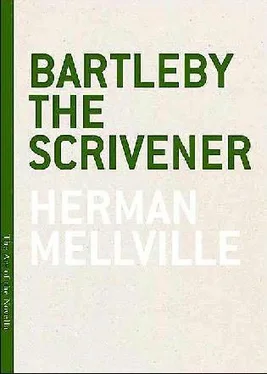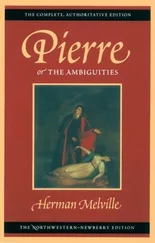"With submission, sir," said Turkey on this occasion, "I consider myself your right-hand man. In the morning I but marshal and deploy my columns; but in the afternoon I put myself at their head, and gallantly charge the foe, thus!" — and he made a violent thrust with the ruler.
"But the blots, Turkey," intimated I.
"True, — but, with submission, sir, behold these hairs! I am getting old. Surely, sir, a blot or two of a warm afternoon is not to be severely urged against gray hairs. Old age-even if it blot the page-is honorable. With submission, sir, we _both_ are getting old."
This appeal to my fellow-feeling was hardly to be resisted. At all events, I saw that go he would not. So I made up my mind to let him stay, resolving, nevertheless, to see to it, that during the afternoon he had to do with my less important papers.
Nippers, the second on my list, was a whiskered, sallow, and, upon the whole, rather piratical-looking young man of about five and twenty. I always deemed him the victim of two evil powers-ambition and indigestion. The ambition was evinced by a certain impatience of the duties of a mere copyist, an unwarrantable usurpation of strictly professional affairs, such as the original drawing up of legal documents. The indigestion seemed betokened in an occasional nervous testiness and grinning irritability, causing the teeth to audibly grind together over mistakes committed in copying; unnecessary maledictions, hissed, rather than spoken, in the heat of business; and especially by a continual discontent with the height of the table where he worked. Though of a very ingenious mechanical turn, Nippers could never get this table to suit him. He put chips under it, blocks of various sorts, bits of pasteboard, and at last went so far as to attempt an exquisite adjustment by final pieces of folded blotting paper. But no invention would answer. If, for the sake of easing his back, he brought the table lid at a sharp angle well up towards his chin, and wrote there like a man using the steep roof of a Dutch house for his desk:-then he declared that it stopped the circulation in his arms. If now he lowered the table to his waistbands, and stooped over it in writing, then there was a sore aching in his back. In short, the truth of the matter was, Nippers knew not what he wanted. Or, if he wanted any thing, it was to be rid of a scrivener's table altogether. Among the manifestations of his diseased ambition was a fondness he had for receiving visits from certain ambiguous-looking fellows in seedy coats, whom he called his clients. Indeed I was aware that not only was he, at times, considerable of a ward-politician, but he occasionally did a little business at the Justices' courts, and was not unknown on the steps of the Tombs. I have good reason to believe, however, that one individual who called upon him at my chambers, and who, with a grand air, he insisted was his client, was no other than a dun, and the alleged title-deed, a bill. But with all his failings, and the annoyances he caused me, Nippers, like his compatriot Turkey, was a very useful man to me; wrote a neat, swift hand; and, when he chose, was not deficient in a gentlemanly sort of deportment. Added to this, he always dressed in a gentlemanly sort of way; and so, incidentally, reflected credit upon my chambers. Whereas with respect to Turkey, I had much ado to keep him from being a reproach to me. His clothes were apt to look oily and smell of eating-houses. He wore his pantaloons very loose and baggy in summer. His coats were execrable; his hat not to be handled. But while the hat was a thing of indifference to me, inasmuch as his natural civility and deference, as a dependent Englishman, always led him to doff it the moment he entered the room, yet his coat was another matter. Concerning his coats, I reasoned with him; but with no effect. The truth was, I suppose, that a man of so small an income, could not afford to sport such a lustrous face and a lustrous coat at one and the same time. As Nippers once observed, Turkey's money went chiefly for red ink. One winter day I presented Turkey with a highly-respectable looking coat of my own, a padded gray coat, of a most comfortable warmth, and which buttoned straight up from the knee to the neck. I thought Turkey would appreciate the favor, and abate his rashness and obstreperousness of afternoons. But no. I verily believe that buttoning himself up in so downy and blanket-like a coat had a pernicious effect upon him; upon the same principle that too much oats are bad for horses. In fact, precisely as a rash, restive horse is said to feel his oats, so Turkey felt his coat. It made him insolent. He was a man whom prosperity harmed.
Though concerning the self-indulgent habits of Turkey I had my own private surmises, yet touching Nippers I was well persuaded that whatever might by his faults in other respects, he was, at least, a temperate young man. But indeed, nature herself seemed to have been his vintner, and at his birth charged him so thoroughly with an irritable, brandy-like disposition, that all subsequent potations were needless. When I consider how, amid the stillness of my chambers, Nippers would sometimes impatiently rise from his seat, and stooping over his table, spread his arms wide apart, seize the whole desk, and move it, and jerk it, with a grim, grinding motion on the floor, as if the table were a perverse voluntary agent, intent on thwarting and vexing him; I plainly perceive that for Nippers, brandy and water were altogether superfluous.
It was fortunate for me that, owing to its peculiar cause-indigestion-the irritability and consequent nervousness of Nippers, were mainly observable in the morning, while in the afternoon he was comparatively mild. So that Turkey's paroxysms only coming on about twelve o'clock, I never had to do with their eccentricities at one time. Their fits relieved each other like guards. When Nippers' was on, Turkey's was off; and _vice versa_. This was a good natural arrangement under the circumstances.
Ginger Nut, the third on my list, was a lad some twelve years old. His father was a carman, ambitious of seeing his son on the bench instead of a cart, before he died. So he sent him to my office as student at law, errand boy, and cleaner and sweeper, at the rate of one dollar a week. He had a little desk to himself, but he did not use it much. Upon inspection, the drawer exhibited a great array of the shells of various sorts of nuts. Indeed, to this quick-witted youth the whole noble science of the law was contained in a nut-shell. Not the least among the employments of Ginger Nut, as well as one which he discharged with the most alacrity, was his duty as cake and apple purveyor for Turkey and Nippers. Copying law papers being proverbially dry, husky sort of business, my two scriveners were fain to moisten their mouths very often with Spitzenbergs to be had at the numerous stalls nigh the Custom House and Post Office. Also, they sent Ginger Nut very frequently for that peculiar cake-small, flat, round, and very spicy-after which he had been named by them. Of a cold morning when business was but dull, Turkey would gobble up scores of these cakes, as if they were mere wafers-indeed they sell them at the rate of six or eight for a penny-the scrape of his pen blending with the crunching of the crisp particles in his mouth. Of all the fiery afternoon blunders and flurried rashnesses of Turkey, was his once moistening a ginger-cake between his lips, and clapping it on to a mortgage for a seal. I came within an ace of dismissing him then. But he mollified me by making an oriental bow, and saying-"With submission, sir, it was generous of me to find you in stationery on my own account."
Now my original business-that of a conveyancer and title hunter, and drawer-up of recondite documents of all sorts-was considerably increased by receiving the master's office. There was now great work for scriveners. Not only must I push the clerks already with me, but I must have additional help. In answer to my advertisement, a motionless young man one morning, stood upon my office threshold, the door being open, for it was summer. I can see that figure now-pallidly neat, pitiably respectable, incurably forlorn! It was Bartleby.
Читать дальше












